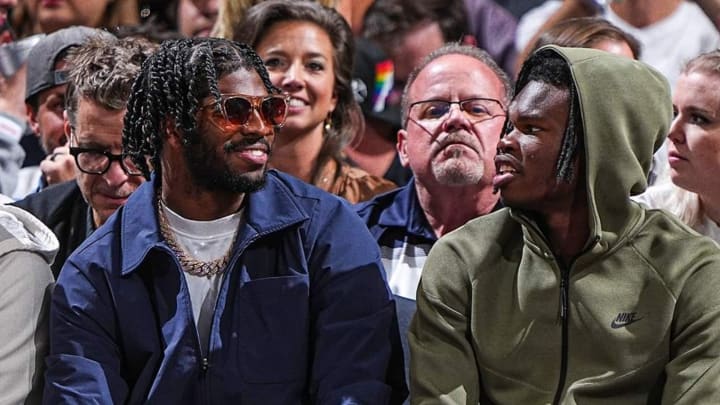Colorado football faces backlash for retiring Shedeur Sanders and Travis Hunter’s jerseys prematurely, sparking debates about traditions and timing.

In a move that has sparked widespread debate, the University of Colorado football program recently announced the retirement of jerseys worn by Shedeur Sanders and Travis Hunter, two key players who have played pivotal roles in the team’s resurgence under head coach Deion Sanders. While this decision might seem like a celebratory gesture on the surface, the circumstances surrounding the retirement of these jerseys have led to significant criticism, with many in the college football world questioning whether the move is premature, ill-advised, or motivated by the growing media spectacle surrounding Coach Sanders’ program.
To understand the depth of the controversy, it is crucial to unpack the careers of Shedeur Sanders and Travis Hunter, the influence of their head coach, Deion Sanders, and the larger context of college football, particularly in the world of jersey retirements and program traditions. Additionally, this situation shines a light on the larger discussion about what it means to be a college football star, the commercialization of college sports, and the role of social media in amplifying narratives that might otherwise remain more localized.
Shedeur Sanders and Travis Hunter: The Faces of a New Era
At the heart of the jersey retirement controversy is the undeniable impact that Shedeur Sanders and Travis Hunter have had on the Colorado football program since their arrival. These two players are not only highly talented but also became symbols of Coach Deion Sanders’ broader vision for Colorado football.
Shedeur Sanders: The Quarterback with Star Power
Shedeur Sanders, the son of Coach Deion Sanders, made a splash in college football when he transferred from Jackson State to Colorado. Known for his poise, strong arm, and leadership skills, Shedeur quickly emerged as one of the top quarterbacks in the country. His decision to follow in his father’s footsteps and play for Colorado was seen as a significant moment in college football, as it represented the infusion of star power and national attention to a program that had struggled in recent years.
Shedeur’s impact on Colorado’s program was immediate. He led the team to impressive victories and posted eye-popping statistics that drew attention from fans and analysts across the country. But beyond his on-field achievements, Shedeur represented a new wave of college football players who understood the importance of their personal brand and their ability to market themselves through social media and NIL (Name, Image, and Likeness) deals. His presence in Boulder not only brought competitive success but also ushered in an era of cultural and financial growth for the program.
Travis Hunter: The Two-Way Sensation
Travis Hunter, a five-star recruit and one of the most hyped players in recent college football history, also followed Coach Sanders from Jackson State to Colorado. As a player who excelled both as a wide receiver and a cornerback, Hunter’s versatility and talent were immediately apparent. He became a two-way starter at Colorado, an uncommon feat in modern college football, where most players specialize in a single position. Hunter’s performances on the field were mesmerizing, and his ability to change the game on both sides of the ball made him a fan favorite.
Like Shedeur, Hunter embraced the spotlight, utilizing his social media presence to grow his brand. He became one of the most marketable athletes in college football, with his jersey sales skyrocketing as fans flocked to Colorado to watch him play. Hunter’s electric performances, paired with his flashy personality, made him one of the faces of Coach Sanders’ revolution at Colorado. His decision to leave Jackson State and join Colorado was seen as another bold step in the rise of both Coach Sanders and the program, and many predicted that Hunter’s legacy in Boulder would be etched in the annals of college football history.
The Jersey Retirement Controversy: A Premature Decision?
Despite their tremendous success at Colorado, the decision to retire both Shedeur Sanders’ and Travis Hunter’s jerseys after such a short period of time has ignited a firestorm of criticism. Retiring a jersey is one of the most significant honors a program can bestow upon a player. Typically, jersey retirements are reserved for players who have made indelible contributions to the program over the course of their careers, often after they have finished their collegiate playing days. The idea is that the player’s impact on the program is so profound that their jersey will never be worn again, serving as a permanent reminder of their legacy.
In this context, many critics argue that retiring the jerseys of Shedeur Sanders and Travis Hunter after just one or two seasons at Colorado is premature. After all, both players are still active and have not completed their college football careers. Furthermore, while both players have certainly been impactful, their legacies at Colorado have not had the time to fully materialize. Their time in Boulder is still in its early stages, and retiring their jerseys while they are still playing for the team raises questions about whether such an honor should be bestowed upon them so soon.
A Culture of Instant Gratification?
One of the major criticisms of the jersey retirement decision is that it reflects a growing culture of instant gratification in college sports. In the past, college football players had to work for years to leave a lasting legacy. Players who earned jersey retirements typically had to prove themselves over multiple seasons, achieving success both individually and as part of a team. Now, however, the rise of NIL deals, social media, and the intense media spotlight on star players has changed the way we view success in college football.
The rapid success of Shedeur Sanders and Travis Hunter has arguably contributed to a desire to celebrate them prematurely. They are both exceptional talents, but does their relatively short time at Colorado warrant such an immediate recognition? By retiring their jerseys now, critics argue that the program is putting style and spectacle ahead of tradition and meaningful accomplishments. The move has been seen by some as a knee-jerk reaction to the overwhelming attention surrounding the players and Coach Sanders, rather than a well-considered decision based on long-term impact.
The Role of Deion Sanders: A Master of Branding
The presence of Coach Deion Sanders, often referred to as “Coach Prime,” cannot be overlooked in this discussion. Deion is not just a football coach; he is a brand. Known for his charismatic personality, flashy style, and larger-than-life presence, Coach Prime has cultivated an atmosphere at Colorado that is centered around attention, entertainment, and media visibility. His influence extends far beyond the football field, with his ability to generate media coverage and bring a level of excitement to the program that is unparalleled in college football.
In many ways, Coach Prime’s persona and ability to generate hype have played a role in elevating the status of Shedeur Sanders and Travis Hunter. They are not just players; they are symbols of Coach Prime’s vision for the future of college football. The jersey retirement decision has been viewed by some as part of a larger media strategy, where the line between sports and entertainment becomes increasingly blurred. By retiring their jerseys, Colorado is making a statement to the world that these two players are legends in the making—whether or not their careers have fully played out.
The Backlash: A Mix of Humor and Criticism
As with most things in the world of college sports, the decision to retire Shedeur Sanders’ and Travis Hunter’s jerseys has sparked intense debate on social media. Many fans and analysts have roasted the move, calling it a publicity stunt or a premature decision that diminishes the significance of jersey retirements. Some have made light of the situation, joking that Colorado might retire a jersey for every player who contributes to the team’s success in a given season. Others have questioned whether the program is prioritizing media attention over actual football accomplishments.
The humor surrounding the jersey retirement controversy has only intensified the scrutiny. The fact that both players are still actively participating in the program adds a layer of absurdity to the situation for many fans, leading to memes, jokes, and viral posts that lampoon the move. In a way, the decision has turned into an example of the tension between the commercialization of college sports and the traditional values that have long governed the game.
What Does This Mean for College Football Moving Forward?
Ultimately, the decision to retire the jerseys of Shedeur Sanders and Travis Hunter raises larger questions about the future of college football and the role of media spectacle in shaping the narrative of programs. As the lines between entertainment and athletics continue to blur, the focus on individual star power—bolstered by social media and NIL deals—becomes more pronounced. Jersey retirements, once reserved for players who had made historic contributions to their teams, are now being used as tools for branding and attention.
The backlash Colorado has faced over this decision serves as a cautionary tale for other programs looking to capitalize on the growing influence of NIL and media attention. While star players like Shedeur Sanders and Travis Hunter are undeniably talented and deserving of recognition, retiring their jerseys after such a short period of time may not be the wisest move, both for the program’s tradition and for the integrity of college football’s long-standing rituals.
As college football continues to evolve in this new era, it will be fascinating to see how other programs navigate the growing influence of individual players, media, and money. The situation at Colorado is just one example of how the game is changing, and how schools must carefully balance the pursuit of success with the preservation of tradition.
In the case of Shedeur Sanders and Travis Hunter, only time will tell if their legacies at Colorado are deserving of jersey retirements or if their place in the annals of college football will be remembered in a different way. For now, the decision to retire their jerseys remains a controversial and highly debated topic, one that will likely continue to provoke discussion for years to come.









